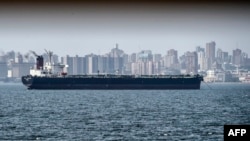The lead vessel of a five-tanker flotilla carrying fuel supplied by Iran to gasoline-thirsty Venezuela was set to arrive at one of state-run PDVSA's ports Sunday, escorted by the military, according to Refinitiv Eikon data and Venezuelan officials.
Iran is providing Venezuela with 1.53 million barrels of gasoline and components in a move criticized by U.S. authorities as both nations are under sanctions, according to the governments, sources and calculations by TankerTrackers.com.
The Trump administration said earlier this month it was considering measures it could take in response to the shipments, without providing specifics.
The gasoline is desperately needed in Venezuela as its refining network has been operating this year around 10% of its 1.3 million-barrel-per-day capacity, forcing it to rely on imports amid U.S. sanctions that limit the sources and types of fuel it can receive.
Tanker Fortune was scheduled to arrive at PDVSA's El Palito port, a facility close to the country's capital, according to a company source and the Eikon data showing its trajectory. A second vessel, the Forest, entered the Caribbean Sea on Saturday afternoon, and the three remaining vessels were crossing the Atlantic, the data showed.
PDVSA did not immediately reply to a request for comment on the exact content of the cargoes or further plans to receive supply from Iran.
Washington has steadily escalated sanctions on PDVSA as part of its effort to oust President Nicolas Maduro, a socialist who has overseen a six-year economic collapse. A senior Trump administration official Sunday said the fuel arriving would last for just a few weeks and would likely benefit only security forces and "people with connections."
"Pretty soon most people will be wondering where it all went and why they couldn't get any," said the official, who spoke on the condition of anonymity.
The official declined to comment on what U.S. response was under consideration, if any. Last week, a Pentagon spokesman said he was unaware of any military move planned against the vessels. But Iran's President Hassan Rouhani on Saturday warned of retaliation if Washington caused problems for the tankers.
The two OPEC nations have previously helped each other in the face of U.S. sanctions. In 2010-2011, PDVSA sent fuel to Iran, which was under sanctions aimed at stifling its nuclear program.
The U.S. Treasury Department earlier this month imposed sanctions on a Chinese firm for doing business with sanctioned Iranian company Mahan Air, which transported refining parts to Venezuela in over a dozen flights earlier this year.





